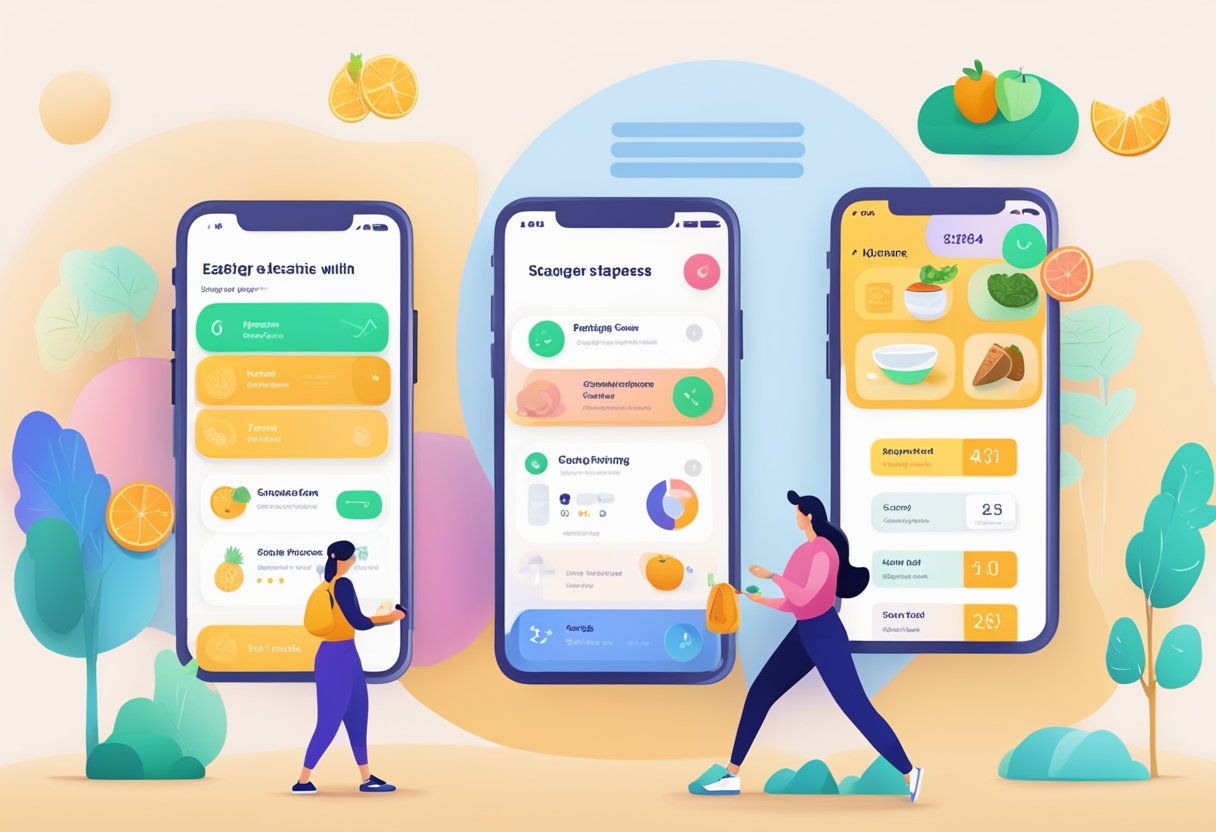ChatGPT is a conversational AI model developed by OpenAI that can generate human-like text based on the prompts it receives.
This technology has been leveraged in various industries, including fitness and nutrition. ChatGPT can be used to ask for workout suggestions, nutrition advice, motivation tips, and much more.

Understanding fitness and nutrition is essential for leading a healthy lifestyle. However, it can be challenging to navigate the vast amount of information available on the internet.
ChatGPT can help individuals personalize their fitness plans by providing tailored recommendations based on their specific needs.
This technology can also assist individuals in setting and achieving their fitness goals, whether it be weight loss, muscle gain, or overall wellness.
By incorporating ChatGPT into dietary guidance, individuals can receive personalized meal plans and nutrition advice. This technology can analyze an individual’s dietary habits and provide recommendations for healthy alternatives.
Additionally, ChatGPT can help individuals track their food intake and monitor their progress towards their nutrition goals.
Key Takeaways
- ChatGPT can be used to personalize fitness plans and assist with achieving fitness goals.
- Incorporating ChatGPT into dietary guidance can provide personalized meal plans and nutrition advice.
- ChatGPT has the potential to revolutionize the fitness industry and improve the overall health and wellness of individuals.
Understanding Fitness and Nutrition

Fitness and nutrition are two essential aspects of a healthy lifestyle. They are interrelated and work together to keep the body functioning optimally. Proper nutrition is necessary to fuel the body for physical activity, while exercise is essential for maintaining a healthy body weight and overall fitness level.
A well-rounded fitness journey includes a combination of strength training, cardio, and flexibility exercises. Strength training is crucial for building muscle mass and increasing strength, while cardio exercises improve cardiovascular fitness and burn calories. Flexibility exercises help maintain range of motion and prevent injury.
It is important to find a balance between different types of exercises to achieve optimal results. High-intensity interval training (HIIT) is an effective way to improve athletic performance and cardiovascular fitness. It involves short bursts of intense activity followed by periods of rest.
Nutrition plays a vital role in overall health and fitness. A balanced diet that includes a variety of nutrient-dense foods is essential for maintaining a healthy weight and preventing chronic diseases. Macronutrients like carbohydrates, proteins, and fats provide energy for physical activity, while micronutrients such as vitamins and minerals are necessary for various bodily functions.
Incorporating healthy eating habits such as portion control, eating whole foods, and staying hydrated can help improve overall health and fitness. It’s essential to consult a healthcare professional or a registered dietitian to create a personalized nutrition plan that meets individual needs.
In summary, understanding the importance of fitness and nutrition is crucial for a healthy lifestyle. Incorporating a variety of exercises and a balanced diet can help achieve optimal results and improve overall health and wellness.
Leveraging ChatGPT for Personalized Fitness Plans

ChatGPT is an AI-powered chatbot that can help individuals create personalized fitness plans based on their individual needs and goals.
This technology leverages natural language processing to understand user input and generate custom workout routines, exercise programs, and nutrition plans.
One of the key benefits of using ChatGPT for personalized fitness plans is that it eliminates the need for a personal trainer. With ChatGPT, individuals can receive guidance and support in real-time, without having to schedule appointments or pay for expensive sessions.
ChatGPT also provides users with prompts for creating custom workouts and exercise routines. These prompts can be tailored to an individual’s fitness level, goals, and preferences, making it easier to stay motivated and on track.
In addition to prompts, ChatGPT can also recommend apps and programs for tracking progress and monitoring power levels during workouts.
This can help you stay accountable and make adjustments as needed to achieve their fitness goals.
Overall, leveraging ChatGPT for personalized fitness plans can be a valuable tool for anyone looking to improve their health and wellness.
With its natural language processing capabilities and ability to generate custom workout routines and exercise programs, ChatGPT can help individuals achieve their fitness goals with ease and convenience.
ChatGPT and Dietary Guidance

ChatGPT is an AI-powered chatbot that can provide dietary guidance to users based on their specific needs and preferences. It can create personalized meal plans, suggest recipes, and provide information on various dietary restrictions and preferences such as vegan, vegetarian, and balanced diet.
For users looking to lose weight, ChatGPT can provide meal plans that are designed to help achieve weight loss goals. These meal plans are tailored to the user’s individual needs and preferences, and can include a variety of foods that are rich in micronutrients.
ChatGPT can also help users with dietary restrictions by providing meal plans that are tailored to their specific needs. For example, if a user has a food allergy or intolerance, ChatGPT can suggest alternative foods that are safe for them to eat.
In addition to meal planning, ChatGPT can also assist with grocery list creation and meal preparation. Users can ask for recipes and cooking tips, and ChatGPT can provide step-by-step instructions on how to prepare meals.
Overall, ChatGPT is a useful tool for those seeking dietary guidance. Its ability to personalize meal plans and provide information on dietary restrictions makes it a valuable resource for those looking to improve their overall health and well-being.
Incorporating Wellness and Recovery with ChatGPT
ChatGPT is not only useful for meal plans and workouts, but it can also provide advice on wellness and recovery. Incorporating wellness and recovery into a fitness routine is essential for maintaining physical and mental well-being.
Here are some ways ChatGPT can help with wellness and recovery:
Sleep
Getting enough sleep is crucial for recovery. ChatGPT can provide tips on how to improve sleep quality and quantity. For example, it can recommend a relaxing bedtime routine or suggest avoiding caffeine and electronics before bed.
Motivation
Staying motivated can be challenging, especially when starting a new fitness routine. ChatGPT can provide motivational tips and tricks to help stay on track. For example, it can suggest setting achievable goals or finding a workout buddy.
Stress Management
Stress can have a negative impact on physical and mental health. ChatGPT can provide stress management techniques, such as deep breathing exercises or mindfulness meditation.
Recovery
Proper recovery is essential for avoiding injury and maintaining progress. ChatGPT can provide advice on how to recover from workouts, such as stretching or foam rolling.
Energy
Maintaining energy levels is important for staying active and motivated. ChatGPT can provide advice on how to boost energy levels naturally, such as through a balanced diet or regular exercise.
Relaxation Techniques
Relaxation techniques can help reduce stress and improve mental well-being. ChatGPT can provide advice on relaxation techniques, such as yoga or progressive muscle relaxation.
Overall, incorporating wellness and recovery into a fitness routine is essential for maintaining physical and mental well-being. ChatGPT can give advice and tips on how to improve sleep, motivation, stress management, recovery, energy, and relaxation techniques.
ChatGPT’s Role in the Fitness Industry and Future Prospects
ChatGPT has been making waves in the fitness industry since its launch. With its ability to provide personalized fitness assistance, it has become a popular tool for individuals looking to improve their health and fitness.
Traditionally, people have relied on personal trainers or fitness apps to guide them through their fitness journey.
However, ChatGPT’s AI technology has made it possible to provide personalized assistance to millions of users worldwide.
One of the key areas where ChatGPT can have a significant impact on the fitness industry is in providing workout programs. ChatGPT can create customized workout programs that are tailored to an individual’s fitness goals, whether it’s muscle gain, stamina, or a 5k run.
This can be especially useful for people who are looking to create a home workout routine and don’t have access to a gym or fitness trainer.
ChatGPT can also provide guidance on proper form and technique, which is essential for anyone looking to avoid injury and maximize their workouts. This can be especially useful for individuals who are new to working out or are looking to improve their technique.
The future prospects of ChatGPT in the fitness industry are promising. As more people turn to technology to help them achieve their fitness goals, ChatGPT’s personalized assistance and workout programs are likely to become more popular.
Additionally, as ChatGPT’s AI technology continues to improve, it may be able to provide even more advanced assistance, such as real-time feedback during workouts.
Overall, ChatGPT’s role in the fitness industry is significant, and its future prospects are promising. Whether you’re a fitness professional or an individual looking to improve your health and fitness, ChatGPT’s personalized assistance and workout programs can help you achieve your goals.
Ethical Considerations and Privacy with AI in Fitness
Artificial Intelligence (AI) has revolutionized the fitness industry. ChatGPT, a large language model, is one of the AI tools that has been adopted in the fitness industry to provide fitness and dietary advice to users. However, the use of AI in fitness raises ethical considerations and privacy concerns.
Ethical Considerations
Healthcare professionals have a responsibility to ensure that the use of ChatGPT is ethical.
Users rely on the accuracy of the information provided by ChatGPT to achieve their health goals. It is therefore important to ensure that ChatGPT provides accurate and reliable information.
A study published on PubMed emphasizes the need for comprehensive ethical guidelines to promote responsible use of ChatGPT. Such guidelines should protect patient privacy, empower patients to make informed decisions about their health care, and prevent bias in the information provided.
Privacy Concerns
The use of ChatGPT in fitness raises privacy concerns.
The information collected by ChatGPT, including sensitive patient information, must be stored securely and used only for the intended purpose. Healthcare professionals must ensure that the collection and storage of this information comply with legal and ethical guidelines. A study published on PubMed Central highlights the need to consider licensing and determining legal responsibility in cases where ChatGPT advice leads to harm or adverse outcomes.
Bias and Views
ChatGPT is a tool that is designed to provide theoretical and practical information to users. However, the information provided may be biased, depending on the views of the developers and the data used to train the model.
Healthcare professionals must ensure that the information provided by ChatGPT is unbiased and based on scientific evidence.
Attention and Productivity
The use of ChatGPT in fitness may affect the attention and productivity of users. Users may become over-reliant on ChatGPT for fitness and dietary advice, leading to a lack of motivation to develop healthy habits. Healthcare professionals must ensure that ChatGPT is used as a tool to supplement healthy habits, rather than a substitute for them.
Conclusion
The use of ChatGPT in fitness raises ethical considerations and privacy concerns.
Healthcare professionals must ensure that the use of ChatGPT is ethical, the information provided is unbiased, and the privacy of users is protected.




